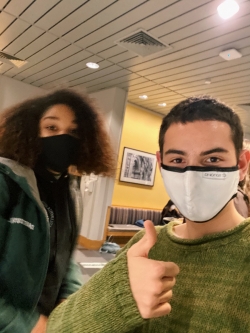

Owen Seiner


The Best of Both Worlds: First-Year Writing as a STEM Student
All freshmen at Dartmouth take at least two writing classes during their first year, consisting of either the two-term Writing 5 and First-Year Seminar combo or the three-term Writing 2-3 and a First Year Seminar sequence. As a student interested in STEM, I was a little apprehensive about taking such a writing and reading intensive course. However, the options for these writing courses truly embody the broad range of the liberal arts: students can take courses on any range of topics from those that take a more scientific approach to those that focus solely on literature and philosophy. Right now, I'm taking a Writing 5 class called Food for Thought, focusing on environmental, agricultural, culinary, and nutritional aspects of the food we choose to eat.
Throughout the class, we've delved into scientific, political, economic, and nutritional views on our food system and potential ways to improve it. On most days, we do some type of reading before getting to class—usually some type of research paper from a scientific journal, an opinion piece in a newspaper, or a poem/short story—and discuss it as a group, getting into interdisciplinary debates with students from a various academic backgrounds and using these class discussions to build our opinions for papers; I can't tell you how many times I've logged off Zoom with my mind completely changed. In terms of assignments, we've already written a personal narrative essay about our relationship with food and an analysis paper critiquing a new-age environmental food movement, and I'm now working on my final research paper on a topic of my choosing as well as a group project about vegan cuisine and misconceptions about it.

Looking forward to the winter term, when I'm taking my first-year seminar, I'm deciding between tons and tons of awesome options, ranging from psychoanalyzing Don Quixote to the philosophy of science. Right now, I'm thinking of taking a class called "Life on Mars" offered by the Earth Sciences department—which, honestly, sounds super cool—especially given my interest in studying biology.
All in all, writing at Dartmouth isn't nearly as intimidating as it seems. The class offerings are not only super interesting but also inclusive, and their discussion-based formats are so conducive to making friends. So, even if you've had a love-hate relationship with English and writing classes in high school, you can definitely start getting excited for your first year writing experience at Dartmouth!
Posts You Might Like

While the Hanover community is always strong and thriving, it's hard to imagine what it's like when you are thousands of miles away from The Green. Read on to learn about my Dartmouth life in Rome, and the community within Dartmouth while abroad.


My experience in my first ever literature class!


All about Writing 5 (and my favorite watches from the course materials!)


During my sophomore spring quarter, I took on the challenge of four STEM courses, and while it has been intense, the unexpected connections across subjects and the joy of learning have made it one of my most rewarding academic experiences yet.


Hello finals week! As I close out a finals season, dive into my bag to see just what gets me through this time of the term!


On the Beijing LSA+, we have real-world Chinese practice every Friday. Last week we went to two neighborhoods, Houhai and Shichahai, and wrote a photo log about our experience. Read along to see what immersive language learning here looks like!


Curious about what a class looks like on a Dartmouth Foreign Study program? Read on!


With so many undergraduates hoping to participate in the exceptional atmosphere of the Tuck School of Business, Tuck created programs specifically designed for us. I was fortunate enough to take part in one of them: TuckLAB Entrepreneurship.


